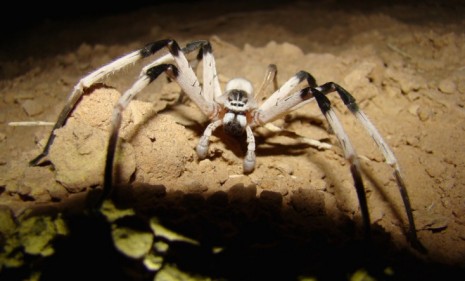The looming extinction of Earth's plants and animals
We still haven't discovered most of the life on Earth, and we're killing it off before we can find it, scientists warn

A free daily email with the biggest news stories of the day – and the best features from TheWeek.com
You are now subscribed
Your newsletter sign-up was successful
What lives on Earth? That basic question — even after centuries of exploration — remains largely unanswered. Scientists using advanced technologies like DNA coding discover thousands of fascinating new species every year in the oceans, in tropical rain forests, and in isolated mountain ranges, but we've barely begun to catalogue the diversity of life on this planet. That's the finding of a new scientific report, whose authors also warn that we may be causing animals and plants to go extinct faster than we can count them. Here, a brief guide:
What don't we know about life on Earth?
Plenty. For starters, we don't even know how many different species of plants, animals, fungi, and protozoa (one-celled organisms) exist today. Previous estimates have ranged from three million up to 100 million, but scientists have named only about 1.3 million of them. "It's astounding that we don't know the most basic thing about life," says Dr. Boris Worm, a biologist at Canada's Dalhousie University, as quoted in The New York Times. Worm and his colleagues estimated in the journal PLoS Biology that there are 8.7 million species on Earth — give or take a million or so.
The Week
Escape your echo chamber. Get the facts behind the news, plus analysis from multiple perspectives.

Sign up for The Week's Free Newsletters
From our morning news briefing to a weekly Good News Newsletter, get the best of The Week delivered directly to your inbox.
From our morning news briefing to a weekly Good News Newsletter, get the best of The Week delivered directly to your inbox.
How did they come up with those numbers?
Taxonomic history and extrapolation. Researchers catalogued all new classes of animal discovered since 1750, and built a "taxonomic pyramid" that used the slowing rate of discovery to estimate the total number of species in well-studied groups like mammals, based on the idea that you can "estimate how big the bottom layer of a pyramid [is] based on the rest of it."
Does everyone agree this is a smart strategy?
Nope. One evolutionary biologist called it "an incredibly ill-founded approach," and others warn that it's not safe to assume that diversity in taxonomic groups we haven't studied much will match the pyramid rules of well-studied groups.
A free daily email with the biggest news stories of the day – and the best features from TheWeek.com
OK, but what did they discover?
About 86 percent of the life on land has never been seen or studied, and over 90 percent of marine life is unknown to us. "There is an age of discovery ahead of us when we could find out so much more of what lives with us on this planet," says Dr. Worm. But we may never have the chance to discover these animals and plants.
Why?
Extinction. Loss of habitat, pollution, and other factors have contributed to massive die-offs of animals in large areas of land and in the oceans. Extinction rates have accelerated so rapidly in recent years that we're losing species at up to a hundred times the normal rate, according to some experts. The information we gain when new species are discovered "is nature's library, and we've only begun to decipher the first ten books," says Dr. Worm, as quoted in National Geographic. "We're throwing out entire books without having a look at them."
Are these endangered plants and animals really so important?
Yes, say scientists. Many advances in medicine, in agriculture, and other critical areas have been made through the discovery of new life. To take one example, a recently discovered species of rice was crossed with conventional rice — the resulting hybrid increased crop yields by a whopping 30 percent. "Given the looming problems of feeding a still-growing world population, the potential benefits of ramping up such exploration are clear," says scientist Lord Robert May of Oxford University, as quoted by ScienceDaily.
Sources: National Geographic, NY Times, ScienceDaily, Washington Post
-
 What is the endgame in the DHS shutdown?
What is the endgame in the DHS shutdown?Today’s Big Question Democrats want to rein in ICE’s immigration crackdown
-
 ‘Poor time management isn’t just an inconvenience’
‘Poor time management isn’t just an inconvenience’Instant Opinion Opinion, comment and editorials of the day
-
 Bad Bunny’s Super Bowl: A win for unity
Bad Bunny’s Super Bowl: A win for unityFeature The global superstar's halftime show was a celebration for everyone to enjoy